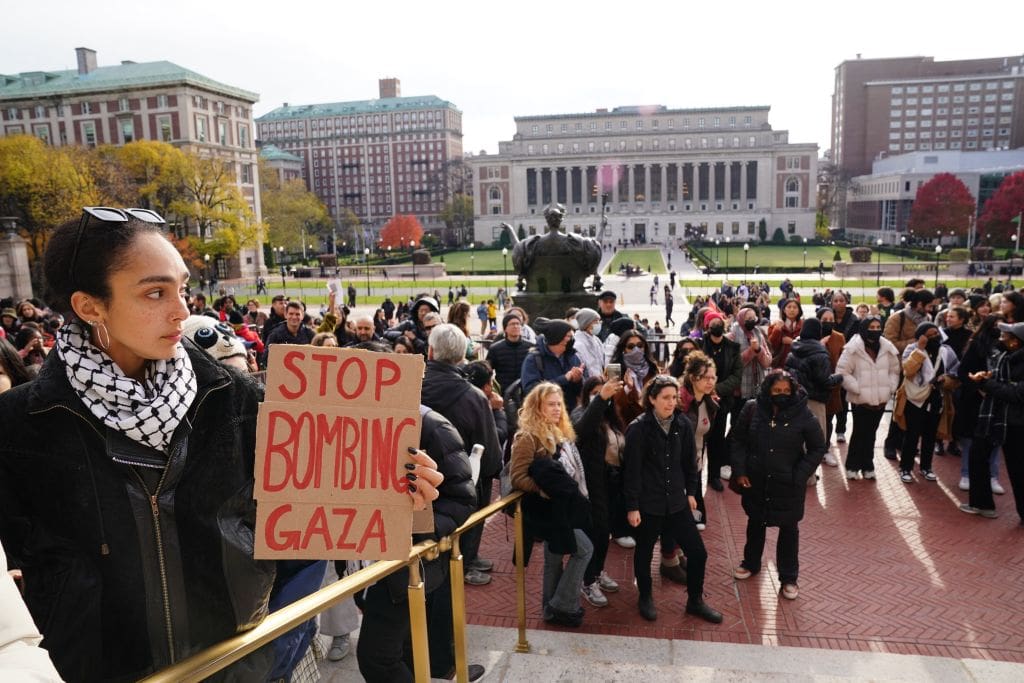Amnesty International USA urges university administrations across the United States of America to safeguard and facilitate all students’ right to peacefully and safely protest or counter protest on their campuses.
Protests in support of Palestinian rights in and around college campuses have been met with obstructive and repressive responses by university administrations. Instead of facilitating and protecting their students’ right to protest, universities’ administrations have gone to great lengths to quash it, even involving local authorities and demanding arrests, while suspending students who engage in peaceful demonstrations.
“Institutions of higher learning are key in helping students understand and claim their human rights. Any steps taken to silence, harass, threaten, or otherwise intimidate those who gather peacefully to protest and speak out is a violation of their rights,” said Paul O’Brien, Executive Director of Amnesty International USA. “Becoming a student does not mean leaving the right to protest at the university gates.”
Academic freedom is central to the right to education under international law, according to Amnesty International. Administrations have a responsibility to foster an atmosphere that allows diverse viewpoints, but also to ensure that all students are able to engage in such discussions. Campus activism is a crucial component of that freedom and discussion. Schools and universities should ensure that all students can safely express their views and beliefs and ensure protection of their rights to freedom of expression and peaceful assembly. Due to the real and known risks of police violence that students could face, administrations should summon law enforcement to disperse campus demonstrations only as a last resort, such as in the face of widespread violence or incitement to violence and discrimination.
“The right to protest is critical to freely speak out against what is happening right now in Gaza,” continued O’Brien. “This is especially true as the U.S. government continues to provide weapons to the Israeli military and is increasingly complicit in the atrocities being committed against Palestinians every single day.”
While criticism of the actions or policies of the Israeli government is not in and of itself antisemitic and should not be used as a pretext to shut down dissent, there are videos circulating of individuals around some campus protests spewing hateful and harmful rhetoric, including glorifying violence such as the attacks committed on October 7 in Israel. Antisemitism, Islamophobia or targeting individuals and communities for their religion, ethnicity or nationality are all hatred and must be condemned. We must hold accountable those who commit, encourage or acquiesce in such abuse and violence, whenever and wherever it is inflicted. The right to be free from discrimination is also a fundamental principle of human rights law, and university administrations should engage with protest organizers to prohibit the use of discriminatory or harassing language which targets any particular group during the demonstrations.
“To be clear, discrimination and promoting violence against Jewish communities are human rights violations,” continued O’Brien. “We at Amnesty International USA condemn hateful rhetoric and violence in the strongest possible terms.”
Throughout history, protests have enabled individuals and groups to express dissent, opinions and ideas, expose injustice and abuse, and demand accountability from those in power. With collective mobilization, creativity and defiance, people who protest are a thorn in the side of those who abuse their power. Helping to shake up rigid and unaccountable power dynamics and structures, protesting has been a vehicle for advancing human rights.
“As the humanitarian disaster in Gaza grows more horrifying each day, and more lives are lost, with U.S. support, it’s no wonder so many students are moved to protest,” said O’Brien. “We continue to call on President Biden to immediately suspend all arms transfers to the government of Israel and to work for an immediate and permanent ceasefire to protect civilians, ensure unimpeded humanitarian aid access, and facilitate the safe release of hostages.”
Background
International human rights law protects the right to protest through a number of separate provisions enshrined in various international and regional treaties which, taken together, provide protests with comprehensive protection. Even though the right to protest is not codified as a separate right in human rights treaties, when people engage in protests, whether individually or collectively, they are exercising a variety of rights, which can include the rights to freedom of expression and peaceful assembly. For more information see Amnesty International’s Protect the Protest Campaign.
Contact: [email protected]

